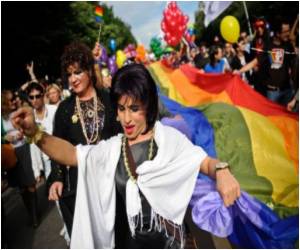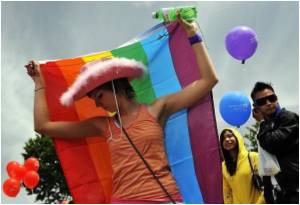In the biggest gay parade in Europe, vast crowds roam around in figure hugging dresses, wigs and high heels

Organisers expected more than a million people at the evening parade, the main event in five days of festivities by defenders of lesbian, gay, bisexual and transgender (LGBT) rights.
The festival kicked off on Wednesday night with an open air appearance by Conchita Wurst, the bearded Austrian transvestite who won the Eurovision song contest in May.
That was followed on Thursday by an annual highlight of the festival: men in high heels and dresses raced on foot through Madrid's gay district, Chueca, cheered on by crowds.
Wurst sang on Friday evening alongside various Spanish stars at a concert in the Vicente Calderon stadium, home to Atletico Madrid football club.
Organisers call it the biggest pride party in Europe.
Madrid police said nearly 500 officers would be in the streets for security.
The groups that organised the march dedicated it this year to victims of discrimination in countries where gays, lesbians, bisexuals and transsexuals are punished, sometimes by death.
"We are organising one of the best Pride events in the world," said Boti G. Rodrigo, leader of FELGTB, in a statement.
"It is time to speak up for all those who cannot, so they can see that they are not alone in suffering, that we are fighting for their freedoms and for our own and that LGBT human rights are inalienable," she added.
The organisers warned in their manifesto for this year's event against the threat of discrimination posed by far-right groups which have gained strength in some European countries.
They added that spending cuts imposed in Spain by the conservative Popular Party during the recent economic crisis had increased discrimination in access to public services such as healthcare.
Spain emerged in the late 1970s from several decades of social conservatism under the dictator Francisco Franco, into an era of liberal reforms.
In 2005 it became the third country in the European Union to legalise gay marriage, after the Netherlands and Belgium. Several other countries around the world have followed.
Source-AFP
 MEDINDIA
MEDINDIA


 Email
Email





